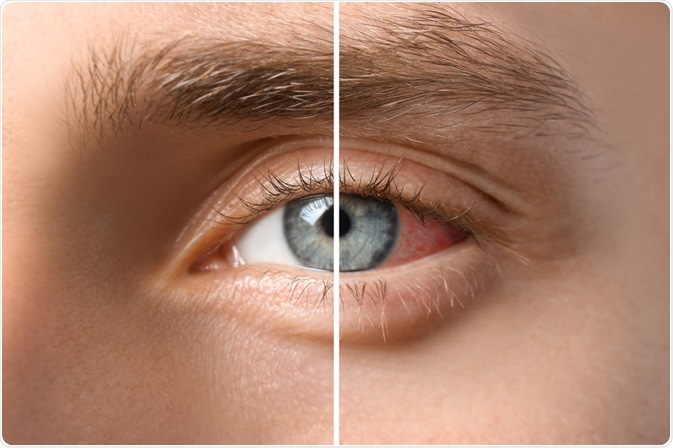It is important for people with uveitis to be treated promptly as the response is usually good and, without treatment, there can be serious complications such as cataracts, glaucoma, band keratopathy, retinal edema and loss of vision.
 Image Credit: Pixel-Shot/Shutterstock.com
Image Credit: Pixel-Shot/Shutterstock.com
Simple lifestyle adjustments can be made to manage symptoms, such as wearing sunglasses to manage photosensitivity and soothing pain with a warm flannel. Non-steroidal anti-inflammatory drugs (NSAIDs) are also often used to manage the inflammation and pain of the eye.
The treatment plan depends on the type of uveitis and the characteristics of the presenting symptoms. The primary aim of treatment is to eradicate inflammation, reduce related pain, prevent subsequent tissue damage and restore any vision loss.
Anterior uveitis
Anterior uveitis, which affects the front area of the eye, is the most common type and has the least chance of leading to serious complications. As a result of this, the treatment plan is usually simpler and has a high success rate.
Eye drops are the first-line choice of medication and can be indicated for two separate purposes. The first is mydriatic eye drops to dilate the pupil of the eye, thus preventing muscle spasms in the iris and ciliary body. Alternatively, eye drops that contain steroid medications such as prednisolone can effectively reduce the inflammatory response.
Intermediate and posterior uveitis
As these types of uveitis are associated with more severe complications, they usually require a more aggressive treatment plan to address the symptoms of the condition.
It is common for an injection to be given into or around the eye, although oral medication, intravenous injection and time-release capsules implanted in the eye may also be used. Direct administration close to the eye offers the advantage of localized therapy, thus decreasing the risk of related adverse effects.
Corticosteroids formulations
Corticosteroid medications like prednisolone work by disrupting the normal function of the immune system to reduce inflammation of the uvea. They can be formulated in various different ways and eye drops, injections and oral medications can be used to treat uveitis.
Eye drops are often the best first-line treatment for inflammation of the eye that does not arise from infection. The recommended dose and administration frequency depend on the severity and duration of symptoms, ranging from hourly to once every second day. Adverse effects of eye drops may include ocular hypertension and blurred vision. If vision is affected, patients should be advised to avoid driving or operating machinery.
Injections can be administered to the side of the eye subconjunctivally or next to the eye periocularly, often with a local anesthetic to numb associated pain. This is usually given as a single dose when symptoms are the most severe, after which other administration methods, such as eye drops, are used.
Oral tablets or capsules come in a higher dose than other formulations and may be used when as a second-line option, as it is associated with systemic effects of corticosteroids. Where possible, the duration of treatment with oral corticosteroids should be limited to avoid long-term side effects such as weight gain, mood changes and osteoporosis.
What is Uveitis?
Immunosuppressant therapy
Immunosuppressive medication may be useful to help reduce the inflammation in patients that are unresponsive to other treatments, although must be used with caution. Prior to the administration of immunosuppressive agents, it should be confirmed that the patient does not have a current infection and should be monitored for signs of infection throughout the duration of therapy.
Medication options include methotrexate, mycophenolate, azathioprine and cyclosporine. It is important that the effect of these medications is closely monitored with regular blood tests, as the side effects can be severe including alopecia, headaches, hypertension, nervous system disturbances and skin rash. As a last-line option, biologic response modifiers such as adalimumab, infliximab, daclizumab, abatacept and rituximab can be used but are associated with an increased risk of cancer.
References
Further Reading
Last Updated: Feb 21, 2023